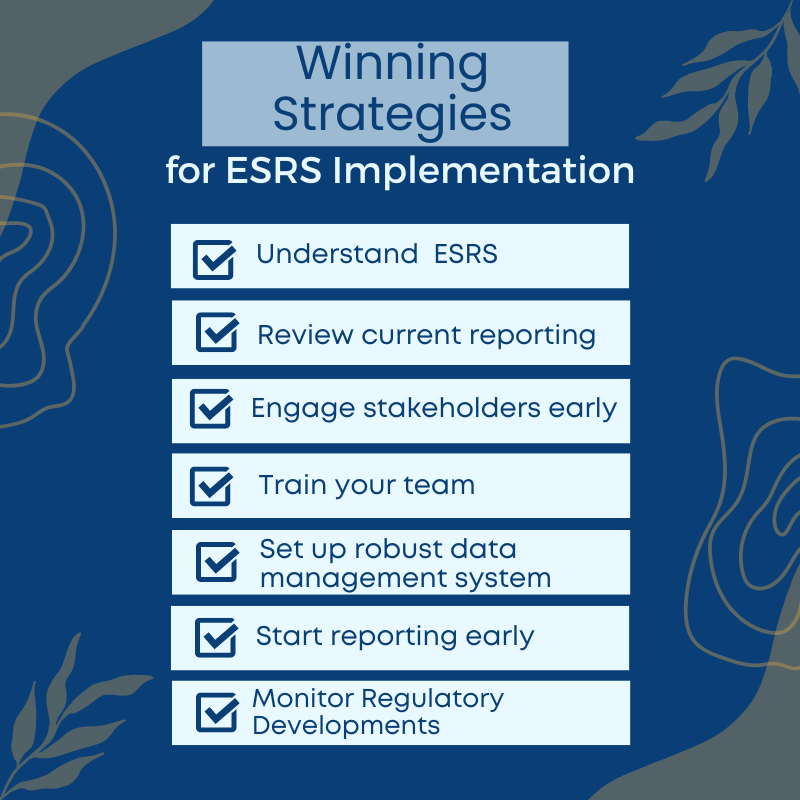What is Sustainability Reporting in the Context of CSRD?
Sustainability reporting is the practice of measuring, disclosing, and being accountable for the environmental, social and governance (ESG) impacts of an organisation. The Corporate Sustainability Reporting Directive (CSRD) is an important European Union initiative that requires companies to disclose information on sustainability-related matters. It is a key tool for creating a sustainable future by providing stakeholders and users of sustainability reports with the information to understand the impacts, risks and opportunities related to an organisation’s operations.
The framework for sustainability reporting includes information on an organisation’s environmental impacts such as carbon emissions and water use, as well as social impacts like human rights and labour relations. The ESG disclosures also assist companies in recognising the environmental, social and governance-related risks and opportunities they face in meeting their strategic objectives.
Sustainability reporting can involve a number of different stakeholders, including partners in the value chain, own workers, affected communities, regulatory bodies and investors. To increase credibility and transparency, third-party assurance of sustainability reports is becoming more common, ensuring that the reported information is reliable.
According to the CSRD, sustainability reporting is also applicable for third-country undertakings (or non-European companies) that operate in the European Union’s markets. Therefore, companies with global supply chains are now taking sustainability seriously as it becomes an important part of their brand and reputation.
In summary, sustainability reporting is a method that is used to measure an organisation’s impacts on the environment, society, and governance, which is critical to creating a sustainable future for all.
If you prefer visual content over reading the blog, take a look at our summary video below.
Why is sustainability reporting important and useful for a company subject to the CSRD?
In today’s world of conscious consumption and socio-environmental awareness, sustainability reporting has emerged as a crucial tool for companies to demonstrate transparency and accountability towards their stakeholders. The benefits of sustainability reporting are multi-fold, ranging from enhanced corporate reputation and access to capital to improved employee retention and risk management. By measuring and disclosing their social and environmental impact through the lens of sustainable development goals (SDGs) and the EU Green Deal, companies can align their strategies with the needs of society and the planet.
Additionally, disclosing material sustainability information can help companies comply with regulatory requirements and address emerging issues, such as climate change and inequality. Moreover, reporting on sustainability performance can improve internal decision-making and drive innovation towards more sustainable practices. Therefore, sustainability reporting not only helps companies meet the expectations of their stakeholders but also creates value for their long-term success.
Sustainability reporting has increasingly become important and useful for companies due to the increasing demand for transparency and accountability from stakeholders. ESG information provides a means for companies to communicate their environmental, social, and governance performance to stakeholders and users of sustainability or non-financial information. These sustainability reports include information on the company’s impact on the environment, social responsibility, and economic performance, among others.
Sustainability reporting benefits companies in various ways and include a better understanding of their own sustainability performance, improved risk management, identification of new business opportunities, and enhanced reputation and credibility amongst stakeholders. Moreover, with climate change being a critical issue, sustainability reporting enables companies to identify their contribution to greenhouse gas emissions and take action to mitigate them. By reporting on their social and environmental performance, companies demonstrate their commitment to sustainability and build trust with their stakeholders.
In conclusion, sustainability reporting has become a crucial tool for companies to enhance their sustainability performance, improve accountability, and build trust with stakeholders.
What Should a Sustainability Report Contain to Comply with the CSRD?
A sustainability report is a publication that communicates a company’s social, environmental, and economic performance regarding sustainable development. To adhere to the European Sustainability Reporting Standards (ESRS), a sustainability report should contain information on general disclosures, including the company’s business model, strategy, governance, and risks.
It should also provide comprehensive information on the company’s impact on climate change, pollution, water, and biodiversity. The report should specify how the company is addressing sustainability challenges and what objectives and targets it has set to minimize its environmental impact.
Additionally, the report should evaluate how the company is managing its own workforce and that of its supply chain partners. To promote transparency and accountability, the report should communicate how the company is engaging with affected communities and consumers.
To be effective, a sustainability report must be transparent, informative, and trustworthy, and it should provide stakeholders with a clear and accurate picture of the company’s sustainability performance.
Overall, a sustainability report should demonstrate a company’s active commitment to sustainable development and outline its efforts to make a positive impact on society and the environment.
What are the Requirements for a Sustainability Report?
Sustainability reporting has become increasingly important in recent years as companies have recognized the need to address environmental, social, and governance (ESG) issues.
The report should also be based on a set of standards, such as the Global Reporting Initiative (GRI) or the European Sustainability Reporting Standard (ESRS), to ensure consistency and comparability. In addition, the European Union requires company to align their reports with the EU Taxonomy to help companies identify environmentally sustainable activities.
The Corporate Sustainability Reporting Directive (CSRD) aims to improve transparency and comparability of sustainability reporting across the EU. It is important to highlight that companies falling under the non-financial reporting directive (NFRD) are now obligated to adhere to the Corporate Sustainability Reporting Directive (CSRD) based on the European Sustainability Reporting Standards (ESRS) developed by the EFRAG. Notably, the CSRD’s scope has been broadened compared to that of the NFRD.
By producing a comprehensive sustainability report based on a set of standards, companies can demonstrate their commitment to sustainability and provide stakeholders with valuable information about their impact on the environment and society.
Benefits of Sustainability Reporting
Sustainability reporting is a valuable tool for companies looking to demonstrate their commitment to sustainable development.
By providing more transparency and accountability, sustainability reporting helps companies build trust with their stakeholders, which in turn enhances their reputation and competitiveness. Moreover, sustainability reports provide essential information that can help stakeholders to understand the company’s sustainability performance, as well as to identify areas for improvement. In this way, sustainability reporting can help companies to identify and manage risks, and to maximize opportunities associated with sustainability.
Additionally, sustainability reporting can foster compliance with environmental, social, and governance regulations and standards, which is increasingly demanded by investors, customers, employees, and other stakeholders.
Thus, sustainability reporting not only contributes to sustainable development but also creates value for the company by enhancing the company’s reputation, improving operational efficiency, and attracting investors who are committed to sustainable practices.
Legal Framework
The legal framework for sustainability reporting is rapidly evolving. In Europe, there are several initiatives aimed at establishing a consistent approach to corporate sustainability reporting. The Corporate Sustainability Reporting Directive, which was recently adopted by the European Parliament, requires certain companies to disclose information regarding their environmental, social, and governance practices. In addition, the European Union is working on developing a set of standard sustainability reporting guidelines known as European Sustainability Reporting Standards, which seek to improve the comparability and reliability of such reporting. Furthermore, the EU Taxonomy, which was introduced in 2020, sets out criteria for determining whether an economic activity is environmentally sustainable. This helps investors and companies to identify and report on the environmental impact of their activities and investments.
It is important to note that there are several other legal frameworks under development in the EU and will be adopted soon. Some examples include the Corporate Sustainability Due Diligence Directive (CSRDD), the EU Deforestation Regulation, the EU Green Claims Directive. And more to come…
The legal framework for sustainability reporting is therefore becoming increasingly defined, and companies that do not take their sustainability reporting seriously risk being left behind. As stakeholders are increasingly demanding more transparency and disclosure on environmental and social performance, the importance of complying with these reporting standards cannot be overstated.
Complying with the CSRD/ESRS
In today’s world, sustainable business practices are becoming increasingly important. Therefore, it is crucial for companies to comply with the CSRD and ESRS. It is important to comply with these standards in a timely manner so that companies can start implementing best reporting practices without delay.
Fortunately, organizations can use tools and services offfered by The CSRD Compass to help them understand the scope of the regulations and develop strategies to comply with them. Additionally, companies can use organizations like ours as an additional resource to assist them in forming an ESG team and managing their data collection and management. By doing so, businesses can ensure that they are meeting the necessary standards and are doing their part to safeguard the environment for future generations.
By taking this action, companies can guarantee compliance with the required regulations and contribute to preserving the environment for forthcoming generations. Ultimately, complying with these sustainability reporting standards is not only the responsible choice for businesses, but also helps to create a better and more sustainable future for everyone.


